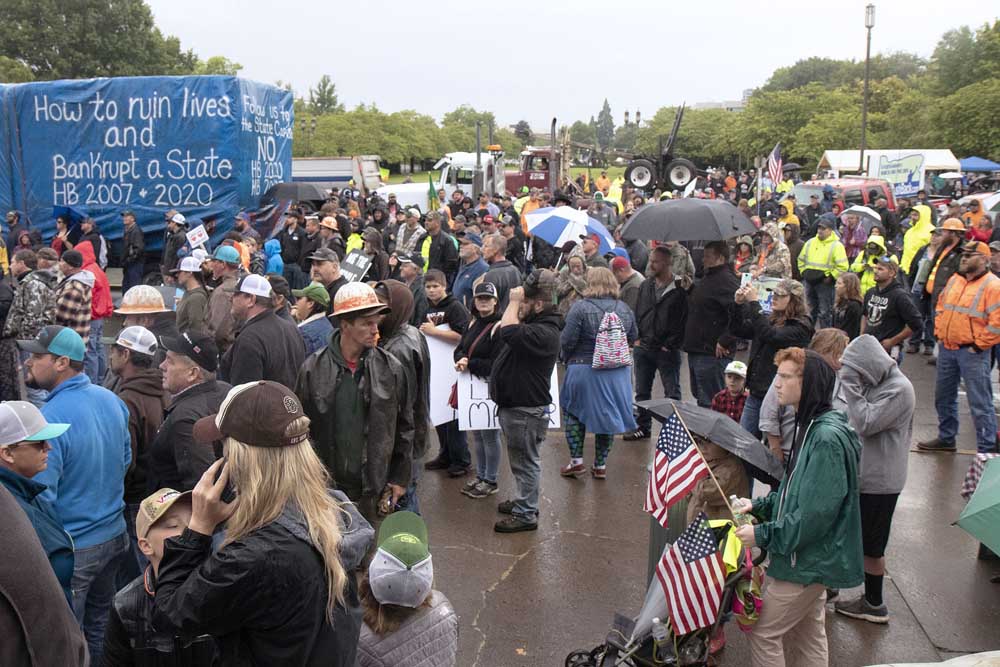Hundreds to descend on Capitol in demonstration against cap and trade bill
Published 3:15 pm Wednesday, February 5, 2020

- Loggers, farmers and others protest in front of the Oregon Capitol in June. Thursday morning, protesters driving big rigs, tractors, dump trucks and other hulking vehicles will flood the Capitol to oppose a greenhouse gas reduction plan they say would cripple the economy and way of life for rural Oregonians.
SALEM — Activists from across Oregon will gather in Salem Thursday as they attempt to break a world record for the largest truck convoy while also aiming to derail key environmental legislation being considered by lawmakers.
#TimberUnity is back, and Thursday morning protesters driving big rigs, tractors, dump trucks and other hulking vehicles will flood the capital to oppose a greenhouse gas reduction plan they say would cripple the economy and way of life for rural Oregonians. The event is a throwback to a nearly identical demonstration that took place last summer to protest a previous version of the bill.
The effort to pass such environmental legislation stalled in the Legislature last year following a walkout by Republican state senators. Democrats, who hold firm majorities in the House and Senate, consider passing a revived version of the bill a priority during the 35-day legislative session.
Angelita Sanchez, a founding board member and secretary of the Timber Unity Association, said that the event is expected to draw truck drivers, loggers, ranchers and people from other professions that rely on heavy machinery that would be affected by the legislation.
“Everybody that works in the natural resources industry across this entire state are going to be trying to get their voices heard,” she said.
Sanchez said trucks from across the state will converge on Interstate 5 between Portland and Salem early in the morning while heading south.
The convoy will peel off onto Salem Parkway with the aim of breaking a world record for the most trucks in a convoy. According to the Guinness Book of World Records, the record stands at 453 during a 2004 truck parade organized by a logistics and transportation company in the Netherlands.
Demonstrators will be bused in throughout the morning from nearby staging grounds to the front of the Capitol for an event that will feature letter-writing, voter registration, petitions and a free meal courtesy of the Marion County Republican Party and Adam’s Rib Smoke House. It’s unclear exactly how many will attend the event, but it could range from the hundreds to potentially more than a thousand demonstrators.
Capt. Timothy Fox, Oregon State Police spokesman, said in an email #TimberUnity planners are expecting between 800 to 1,000 trucks. He said it’s expected to significantly affect traffic surrounding the Capitol as well as routes from sites where protestors will gather before heading to the Capitol.
Those sites include the Oregon State Fairgrounds in Salem, Volcanoes Stadium in Keizer and the Polk County Fairgrounds in Rickreall.
“The Capitol will be open and staffed accordingly to ensure everyone’s safety and rights are maintained,” he said, noting that several hundred people are expected to enter the Capitol to speak with legislators.
Lt. Treven Upkes, spokesman for Salem Police Department, said that there won’t be any road closures associated with the event and that organizers didn’t need a permit.He said that there will be an unusual amount of traffic in the Salem area from 7 a.m. to 9 a.m. Thursday and from 3 p.m. to 4:30 p.m.
Upkes said organizers don’t plan on having many vehicles drive around the Capitol. While Salem police will have increased traffic enforcement, he said that as long as vehicles aren’t blocking traffic and are obeying laws they can drive around as long as they want.
Sen. Michael Dembrow, a Portland Democrat who is sponsoring the controversial legislation, said Monday he’s revised the legislation to address concerns raised about it. He said the Legislature had received 1,500 pieces of written testimony so far.
Timber Unity board member Todd Stoffel — a Washington-based truck owner and operator with business in Oregon, said Oregon’s most vulnerable citizens, elderly on fixed incomes and low-income families, would be hurt by the legislation.
“What they’ve done is give… these carve outs for big polluters over the next 30 years,” Stoffel said. “The rest of us end up paying the price with higher fuel prices, higher, double-digit energy cost increases, and on down the line.”






